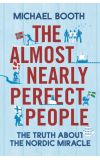
23 Jan 2014 02:49:26
In Michael Booth's informative, if strenuously humorous, book on Scandinavia, the Finns emerge as the booziest of all the Nordic peoples. During the 1939-40 winter war against Soviet Russia, they steeled themselves against the cold by drinking large quantities of vodka, schnapps and other high-proof spirits. Sobriety has rarely been the Nordic way, and in parts of Scandinavia heavy drinking is a sign of masculinity. Prohibition laws were introduced in Finland in 1919, but these had little effect on the Finnish composer Jean Sibelius, for one, who continued to indulge in multi-day benders. The isolation and loneliness of the Nordic fjords and farmsteads engendered bouts of depression in his compatriot Tove Jansson, author of the Moomin stories, who lived in dread of Finland's winter.
Booth's study of Scandinavia and its people is opportune: Nordic noir has never been more fashionable. Peter Høeg's Danish thriller Miss Smilla's Feeling for Snow, published in 1993, radiated a new kind of polar chill. It was Sweden's Henning Mankell, however, who kicked open the door for crime: his Kurt Wallander mysteries have been followed into English by other Scando thriller writers, notably Stieg Larsson.
The appeal to Anglo-Saxon audiences is easy to understand. While there is something new and strange in Nordic noir, the genre is also reassuringly familiar: the dyspeptic, whisky-guzzling Swedish cop Wallander is a sort of Baltic Inspector Rebus; the flat, monotonous landscapes of the Danish TV crime epic, The Killing, could almost be those of Norfolk. As well as promoting Faroe Isle knitwear trends (right), The Killing introduced us to the steely detective inspector Sarah Lund, who placed a very Lutheran emphasis on hard work and thought of herself (as, it seems, do many Danes) as a regular and orderly citizen, if prone to moments of gloom.
Throughout his book, Booth marries travelogue with history and personal experience. The spirit of paganism endures in Denmark, he says, in the midsummer nature rite of 24 June – St John's Day – when people gather to build bonfires and drink and dance in the woods. At midnight on that day the sun glides into reverse and the winter's cold is only a memory. The white days and white nights of the Nordic midsummer are lovely to behold, and as good a reason as any to live in Scandinavia.
The five countries under Booth's review – Denmark, Iceland, Norway, Finland and Sweden – differ hugely from each other in spite of family resemblances. Finland is not really "Scandinavian" at all: the term refers to peoples of the original Viking lands. The Finns (like their Estonian cousins across the Gulf of Finland) are, in a sense, strangers in the Viking-European family. Booth, who lives in Denmark with his Danish-born wife and children, is an "unashamed groupie and cheerleader" for Finland and the Finnish way of life. For all their tendency to drink, the Finns are a stoical and hospitable people. Danes and Swedes may look down on them as glorified tribal marauder folk, yet they have the best schools in the world and one of the highest standards of living too. "If you want the American dream," Ed Miliband announced a couple of years ago, "go to Finland."
At the heart of the "Nordic miracle" is social democracy – but the much-admired political model is apparently not what it was. In recent years the fashion for all things Scandinavian has been bolstered by The Bridge TV series, with its Porsche-driving, Asperger's-affected Swedish detective Saga Norén, and by Borgen, the political thriller set in Copenhagen. Yet these dramas often focus on terrorism and social disaffection. Behind the roseate flush of Scandinavia's social-democratic prosperity, they seem to be saying, lies a creeping social malaise.
Sweden, in particular, is a country whose socialist experiment appears to be over. For three decades now, the Swedes have been haunted by the murder of their prime minister Olof Palme in 1986. The failure of the authorities to find Palme's killer has created a dangerous scepticism about the Swedish justice system and state institutions in general. Sweden's vaunted open society took another blow in 2003, Booth argues, when the country's foreign minister Anna Lindh was stabbed to death in a Stockholm department store. What has gone wrong? One answer is that Lutheran-socialist ideals of community and co-operation have been undermined by the rise of consumerism and the mass uniculture of Microsoft and McDonald's.
But there is also a darker story. Norway has a far-right political presence at variance with Scandinavia's vaunted egalitarianism. The murders committed in 2011 by the neo-Nazi Anders Breivik agitated memories of wartime occupation. Norway's pro-Nazi leader in 1942-1945, Vidkun Quisling, supported Hitler and his biological antisemitism. The country's greatest novelist, Knut Hamsun, was also a Hitlerite. No issue is of more concern to the Nordic right than immigration, which has presented a serious challenge to the Scandinavian welfare-state model.
Booth's amalgam of travel and history is intended to be amusing. His chapter titles – "Pendulous Breasts", "Somali Pizza" – give a sense of his schoolboy humour. In Stockholm, he sets out to offend bourgeois Swedish proprieties by behaving as "unSwedishly as possible": slurping beer in a museum, talking loudly to people on trains. These "Swede-taunting" exercises (as Booth calls them) are carried out in the name of research, but they are pretty embarrassing.
In pages of chatty prose, he conjures the tundra-like landscapes and the reindeer pastures of Nordic lands. Along the way, he dilates interestingly on inter-Nordic rivalries. The Danes are increasingly the "butt of jokes" throughout Scandinavia; their guttural-sounding language is routinely mocked on Norwegian TV as a throaty gibberish. The purest of the Nordic languages is spoken by the Icelanders, whose Old Norse-derived speech is as old as the geysers and glaciers of Moominland.

